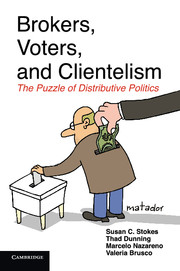Book contents
- Frontmatter
- Dedication
- Contents
- List of Tables
- List of Figures
- Preface and Acknowledgments
- I MODALITIES OF DISTRIBUTIVE POLITICS
- 1 Between Clients and Citizens: Puzzles and Concepts in the Study of Distributive Politics
- II THE MICRO-LOGIC OF CLIENTELISM
- III THE MACRO-LOGIC OF VOTE BUYING: WHAT EXPLAINS THE RISE AND DECLINE OF POLITICAL MACHINES?
- IV CLIENTELISM AND DEMOCRATIC THEORY
- Appendix A: Argentina Brokers' Survey
- Appendix B: Argentina Voters' Surveys
- Appendix C: Venezuela Voters' Survey and the Maisanta Database
- Appendix D: India Voters' Survey
- References
- Index
- Miscellaneous Endmatter
1 - Between Clients and Citizens: Puzzles and Concepts in the Study of Distributive Politics
Published online by Cambridge University Press: 05 June 2014
- Frontmatter
- Dedication
- Contents
- List of Tables
- List of Figures
- Preface and Acknowledgments
- I MODALITIES OF DISTRIBUTIVE POLITICS
- 1 Between Clients and Citizens: Puzzles and Concepts in the Study of Distributive Politics
- II THE MICRO-LOGIC OF CLIENTELISM
- III THE MACRO-LOGIC OF VOTE BUYING: WHAT EXPLAINS THE RISE AND DECLINE OF POLITICAL MACHINES?
- IV CLIENTELISM AND DEMOCRATIC THEORY
- Appendix A: Argentina Brokers' Survey
- Appendix B: Argentina Voters' Surveys
- Appendix C: Venezuela Voters' Survey and the Maisanta Database
- Appendix D: India Voters' Survey
- References
- Index
- Miscellaneous Endmatter
Summary
Markets distribute goods. The drive to earn and to consume moves steel from Anshan to Minnesota, nannies from Brixton to Hampstead, and credit from Wall Street to Athens. Indeed, the movement of steel, nannies, and credit is in a sense what markets – for goods, services, and finance – are.
Politics also distributes goods. Government programs channel cash, jobs, credit, and myriad other resources to citizens; elected officials mete out benefits to favored constituencies; and political parties distribute everything from leaflets to liquor in search of votes. And taxes and transfers redistribute income.
The political distribution of goods is more controversial than is their distribution through markets. We expect markets to move valued resources across space and populations. But while few would object to all forms of political distribution, nearly all would object to some forms of it. In any democracy there is broad agreement (though not consensus) that political authority rightly transfers resources across generations by using tax proceeds to fund the education of children or protect of the elderly from penury. Agreement about redistribution through social welfare programs and insurance against social risk is also broad, though far from universal. However, other kinds of political distribution and redistribution – contracts that go to politically connected private firms, for instance, or cash payments in return for votes – are broadly reviled. Indeed, although some forms of political distribution are unquestioningly accepted, others are punishable with prison terms.
- Type
- Chapter
- Information
- Brokers, Voters, and ClientelismThe Puzzle of Distributive Politics, pp. 3 - 28Publisher: Cambridge University PressPrint publication year: 2013
- 5
- Cited by



